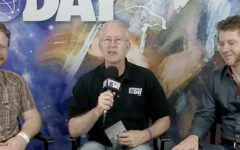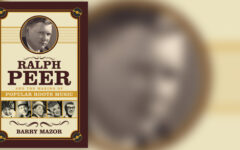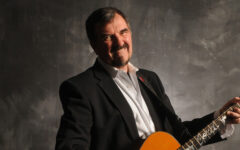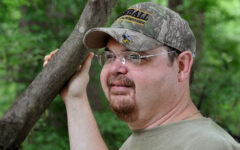
As previously reported, Charles Richard ‘Dick’ Freeland passed away on Thursday, August 14, 2014, at his home after a prolonged illness. He was 76 years old.
Born June 23, 1938, Dick Freeland was a native of Pennsylvania.
He “always had a robust interest in bluegrass music,” watching Buzz Busby’s weekly television show Hayloft Hoedown, which spearheaded the popularity of bluegrass music in the Washington DC area, where Freeland later lived.
Shortly before Christmas 1959, Freeland, with Bill Carroll, and Sonny ‘Zap’ Compton, got together to start Rebel Records. Carroll was Freeland’s Northwestern High School, (Hyattsville, Maryland), friend and later a bluegrass artist, who had his own record label.
Their first single was Cotton Dice / Making Love to a Stranger (FF 225) by Pete Pike, released in February 1960.
The label’s first bluegrass release – its fifth single – featured Earl Taylor & the Stony Mountain Boys, doing a 1962 re-make of The Children Are Cryin’ (aka Callin’ Your Name).
Two more years passed before the release of the label’s first LP, Bill Carroll’s & Mickey Burke’s Down Home Bluegrass (Rebel RLP 1472), the catalog number being a reflection of the cost of the film and paper used to print the first album jacket – $14.72.
The second LP is best thought of as a part of a four-LP collection (SLP 1473/6), originally released in paper sleeves and advertised on radio as far afield as on Wheeling’s WWVA. Later they were available in a neat LP-sized box, titled 70 Song Bluegrass Spectacular (R 1473-1476, 1965). Together they cataloged the best recordings representing the great early bluegrass music coming out of Washington, DC and the surrounding region.
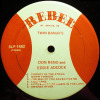 Over its first twenty years, Rebel Records focused on the local bluegrass scene, issuing scores of 45 rpm and 33 1/3 albums by DC-oriented groups as diverse as Pete Pike, The Country Gentlemen, Buzz Buzby and Curly Ray Cline.
Over its first twenty years, Rebel Records focused on the local bluegrass scene, issuing scores of 45 rpm and 33 1/3 albums by DC-oriented groups as diverse as Pete Pike, The Country Gentlemen, Buzz Buzby and Curly Ray Cline.
While the label continued to release singles, they also released the some landmark LPs including Best of the early Country Gentlemen featuring Young Fisherwoman (SLP 1494, 1970); Cliff Waldron & the New Shades of Grass Right On! (SLP 1496, 1970); the classic albums Ralph Stanley Cry from the Cross (SLP 1499, 1971) and Ricky Skaggs / Keith Whitley 2nd Generation Bluegrass (SLP 1504, 1971), and the Seldom Scene’s Act 1 (SLP 1511, 1972).
While some of the artists had recorded before joining Rebel Records their careers took off thanks to their association with Dick Freeland and his promotion of their records. Freeland made sure that all the local area DJs got a copy of his records as he delivered them to the radio stations personally.
In 1970 Freeland visited Japan to attend Expo Osaka and to further arrange the licensing and release of Rebel Records in that country. While there he was entertained by Bluegrass 45, a Japanese bluegrass quintet. Impressed by the group, Freeland invited them to visit the States, which they did, to much acclaim, the following summer.
While there, Bluegrass 45 recorded their first LP for Rebel Records, Bluegrass 45 (SLP 1502, 1971).
Slowly but surely Rebel Records became the bluegrass record label, with not only local, but national and international patronage.
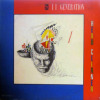 Freeland added other new artists to the label; the Marshall Family, by way of Ralph Stanley’s love of their gospel harmonies (they debuted with Come Springtime (SLP 1541, 1975)); Eddie Adcock’s then progressive new group, IInd Generation, who brought an eclectic, edginess to bluegrass music (their trio of releases began with Head Cleaner * (SLP 1533, 1974)); two staunch traditionalists, Del McCoury & the Dixie Pals (who made their debut on the Rebel label with Del McCoury (SLP 1542, 1975) and the Goins Brothers (who also released a self-titled LP in 1975 (SLP 1543)); and the aggressive young contemporary group Southbound (whose only LP for Rebel Records, Southbound (SLP 1570,) was released in 1977.
Freeland added other new artists to the label; the Marshall Family, by way of Ralph Stanley’s love of their gospel harmonies (they debuted with Come Springtime (SLP 1541, 1975)); Eddie Adcock’s then progressive new group, IInd Generation, who brought an eclectic, edginess to bluegrass music (their trio of releases began with Head Cleaner * (SLP 1533, 1974)); two staunch traditionalists, Del McCoury & the Dixie Pals (who made their debut on the Rebel label with Del McCoury (SLP 1542, 1975) and the Goins Brothers (who also released a self-titled LP in 1975 (SLP 1543)); and the aggressive young contemporary group Southbound (whose only LP for Rebel Records, Southbound (SLP 1570,) was released in 1977.
He also helped to launch the recording careers of Tony Rice, with California Autumn (SLP 1549, 1975), and Ricky Skaggs, with That’s It! (SLP 1550, 1975), both of whom had solo albums released by Rebel Records. Freeland re-issued the classic J D Crowe (then with the Kentucky Mountain Boys) album The Model Church (REB 1585, 1978).
Among the many excellent studio recorded releases Rebel Records issued two live albums the Seldom Scene’s stellar Live At the Cellar Door (SLP 1547-48, 1975) and Live At McClure, Virginia (SLP 1554-55,1976), which captured some of the performers at Ralph Stanley’s bluegrass festival in May 1975.
 While on the subject of the Seldom Scene and Ralph Stanley, both were very important in the growth of the label. Over the years the Seldom Scene had albums released at almost the rate of one a year through to 1976; following the afore-mentioned Act 1, were Act Two (SLP 1520, 1973), Act 3 (SLP 1528, also released in 1973), Old Train (SLP 1536, 1974) and The New Seldom Scene Album (SLP 1561, 1976). All have been regarded as supreme sets. Meanwhile, Freeland issued six Ralph Stanley LPs; Something Old, Something New, Some of Katy’s Mountain Dew (SLP 1503, 1971), Old Country Church (SLP 1508, 1972), Plays Requests (SLP 1514, 1972), I want to Preach the Gospel (SLP 1522, 1973), A Man and His Music (SLP 1530, 1974), Let me Rest on a Peaceful Mountain (SLP 1544, 1975), and Old Home Place (SLP 1562, 1976).
While on the subject of the Seldom Scene and Ralph Stanley, both were very important in the growth of the label. Over the years the Seldom Scene had albums released at almost the rate of one a year through to 1976; following the afore-mentioned Act 1, were Act Two (SLP 1520, 1973), Act 3 (SLP 1528, also released in 1973), Old Train (SLP 1536, 1974) and The New Seldom Scene Album (SLP 1561, 1976). All have been regarded as supreme sets. Meanwhile, Freeland issued six Ralph Stanley LPs; Something Old, Something New, Some of Katy’s Mountain Dew (SLP 1503, 1971), Old Country Church (SLP 1508, 1972), Plays Requests (SLP 1514, 1972), I want to Preach the Gospel (SLP 1522, 1973), A Man and His Music (SLP 1530, 1974), Let me Rest on a Peaceful Mountain (SLP 1544, 1975), and Old Home Place (SLP 1562, 1976).
However, by 1976 Freeland reached a point of burn out brought about by and large by his very hands-on approach when it came to recording sessions.
Originally established and managed in Mount Rainier, Maryland, in 1975 Freeland and his wife, Sheila, moved to Asbury, West Virginia, where he continued to operate Rebel Records.
In 1979 Freeland sold Rebel Records to David Freeman, the owner of County Records.
In 1993, after several years of retirement from the recording business (actually an enforced break due to a no-competition clause in the Rebel sales agreement with David Freeman), he founded Charles R. Freeland Recording Company (CRFRC) which he continued to operate until his death, although declining health had severely limited his participation in recent years.
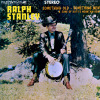 Over a dozen years Freeland released 30 CDs featuring recordings by Ralph Stanley, The Principles, the late James Alan Shelton, the Cooke Duet, New Harvest, Charlie Waller and the Country Gentlemen, George Shuffler, and James Price.
Over a dozen years Freeland released 30 CDs featuring recordings by Ralph Stanley, The Principles, the late James Alan Shelton, the Cooke Duet, New Harvest, Charlie Waller and the Country Gentlemen, George Shuffler, and James Price.
Freeland also played a part in another very significant event in the history of bluegrass music. In July 1966 he joined Pete Kuykendall, Dick Spottswood, Gary Henderson, Diane Sims and several others in helping to found the bluegrass ‘bible,’ the monthly Bluegrass Unlimited magazine.
In 1993 he was honored by the IBMA, receiving the Distinguished Achievement Award.
We quoted Gary B Reid before but it bears repeating …….
“…… no chapter on the history of bluegrass would be complete without an accounting of Dick Freeland’s fundamental role in the development of the bluegrass recording industry.”
* The image on the LP sleeve unwittingly foretold Adcock’s neuro-surgery of recent years.

